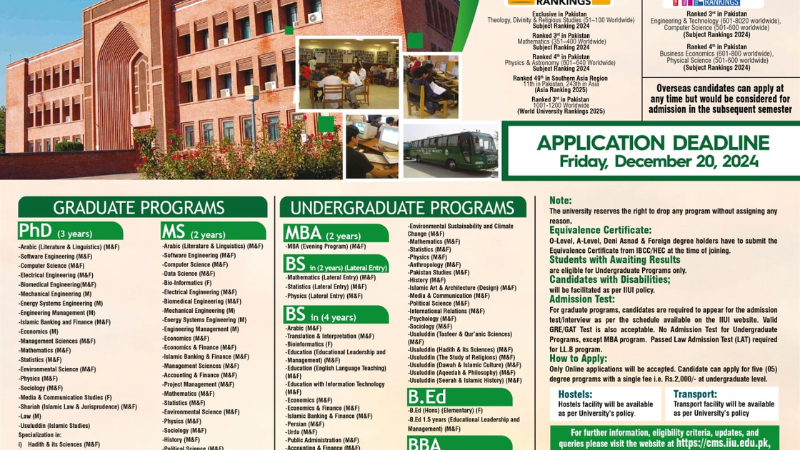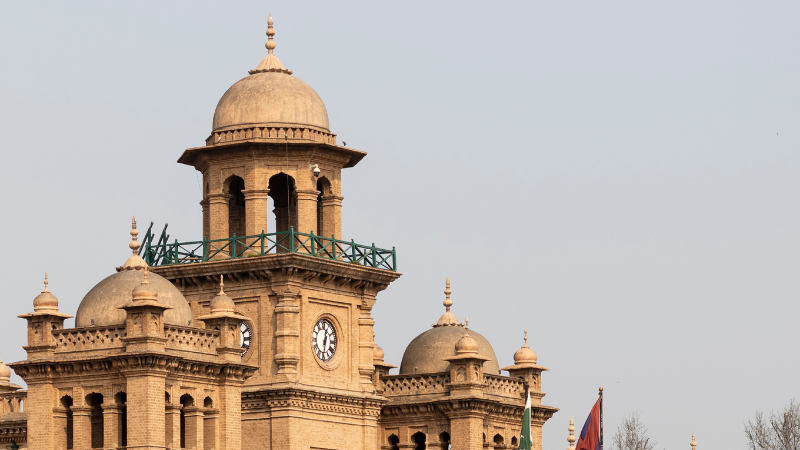2025: The Remarkable Development of Islamic Studies Institutions in Pakistan
Introduction:
Islamic Studies in Pakistan holds a significant place in the nation’s educational and cultural framework, reflecting the country’s deep-rooted Islamic heritage and identity. Since its creation in 1947, Pakistan has placed a strong emphasis on the promotion and development of Islamic education, with institutions dedicated to the study of Islam and its various branches, including theology, law, history, and philosophy. These institutions not only serve as centers of academic learning but also play a pivotal role in preserving and promoting Islamic values, heritage, and knowledge.

The development of Islamic Studies in Pakistan can be traced back to the early years of independence, where religious education was integrated with modern academic systems. Over time, various institutions, ranging from religious seminaries (madrasas) to universities offering specialized degrees in Islamic Studies, have flourished. These institutions have contributed immensely to the intellectual discourse surrounding Islamic thought, contributing to both local and global scholarship.
Table of Contents
Development and Institutions of Islamic Studies in Pakistan
Pakistan is an Islamic republic where the development of Islamic sciences and Islamic institutions have always been central. Since the establishment of Pakistan, popularizing Islamic teachings and implementing Islamic principles in the society has been a primary objective. That’s why numerous seminaries, universities and research institutes have been established here for the promotion of Islamic sciences, which are playing an important role in the development and promotion of Islamic sciences.

Historical roots of Islamic sciences
Islamic studies had started in the subcontinent centuries ago. When Muslims came to the subcontinent, they established madrassas and mosques to spread religious knowledge. Especially during the Mughal period, many madrasahs and academic institutions were established for the development of Islamic sciences, where sciences such as Quran, Hadith, Fiqh and Tafsir were taught. After the establishment of Pakistan in 1947, initiatives were taken at both the public and private levels to promote Islamic studies at the national level.

Islamic institutions in Pakistan and their types
There are many institutions involved in the promotion of Islamic studies in Pakistan, which represent different schools of thought. These include madrassas, universities, and research institutes that provide education in various areas of Islam.
Schools
Madrasahs are important centers of Islamic studies in Pakistan where religious education is imparted to millions of students. Subjects such as Qur’an, Hadith, Fiqh, Tajweed, Tafsir and Knowledge of Kalam are taught in madrasahs. Madrasas working under the Deobandi, Barelvi, Ahl al-Hadith, and Ahl Shia schools of thought have formed various madrasa networks, such as Darul Uloom Karachi, Jamia Darul Uloom Haqqania Akora Khattak and Jamia Naimiya Lahore etc.
Universities
Universities of Pakistan are also playing an important role in the promotion of Islamic sciences. Islamic University Islamabad, Punjab University Lahore, Karachi University and Bahauddin Zakaria University have various departments of Islamic Studies. These universities have dedicated departments for Islamic studies that teach Islamic history, Islamic society, Islamic philosophy, and Islamic law. Research is also conducted in these institutions according to the requirements of modern times which helps to understand Islamic sciences in a new way.
Islamic Ideology Council and Research Institute
Institutions like the Council of Islamic Ideology and the Institute of Islamic Research have been established in Pakistan to help promote Islamic teachings and ensure their application in society. The function of the Islamic Ideology Council is to guide government institutions in adapting the country’s laws to Islamic principles, while the Research Institute strives to popularize Islamic research and Islamic sciences in a modern scientific manner.
Role of Islamic Studies in Modern Research
Various universities and institutes in Pakistan are conducting research on Islamic topics. Modern exegesis of the Qur’an and Hadith, Islamic law and economics include research as per the requirements of the present day. For example, the introduction of modern banking system and Islamic insurance in Islamic finance is an important aspect that many research institutes in Pakistan are working on.
Importance and Challenges of Madrasahs
Madrasahs in Pakistan are not only promoting Islamic studies but also providing access to religious education in remote areas of the country. However, madrasahs also face various challenges, including modern educational requirements, lack of financial resources, and reforms in the education system. The government and private institutions are taking various steps to bring madrasas in line with modern education, including registration of madrasas and changes in curriculum.
Islamic Studies and Pakistani Society
The teachings of Islamic sciences have a significant influence in Pakistani society. Individuals and institutions here try to adopt Islamic principles in their daily lives. Islamic sciences have introduced the principles of ethics, justice, honesty and distinction between halal and haram in Pakistani society. These principles have helped in the application of Islamic teachings at the individual and collective level in Pakistani society.
Role and policies of government
The government is taking various steps to support Islamic studies and institutions in Pakistan. In the national education policy, religious education has been given primary status and various Islamic universities and madrasas are supported at the government level. The government has recognized various religious institutions and efforts are being made to harmonize their curriculum with modern education. Financial support and educational facilities are being provided to these institutions by the government so that the development of Islamic sciences can be accelerated.
Future development of Islamic sciences
There are both various challenges and opportunities for the development of Islamic studies in Pakistan in the future. The use of modern technology, online Islamic courses and new fields of research in Islamic sciences can play an important role in the development of Islamic sciences. Apart from this, there is a need to raise awareness about religious education and Islamic sciences among the Pakistani youth so that they can understand and practice Islamic teachings according to the requirements of modern times.
Problems faced in the development of Islamic sciences
There are also many difficulties in the development of Islamic sciences in Pakistan. Among them, the biggest difficulty is that madrasahs are not compatible with modern education. Apart from this, differences between madrasas of different schools of thought can also hinder the development of Islamic sciences. To solve these problems it is necessary to provide madrasas with a unified system of education and to include modern subjects in the curriculum.
The result
The development and institutions of Islamic studies in Pakistan are important in social, educational and religious terms. Madrasahs, universities, research institutes, and the government are working together for the promotion of Islamic sciences. Through the development of Islamic sciences, the message of Islam is becoming common in Pakistan and the tendency of people to love religion and practice Islamic teachings is increasing. With the development of Islamic sciences and the strength of institutions, it is possible to promote Islamic principles and establish a stable religious society in Pakistan.
——————-
you may also like:


